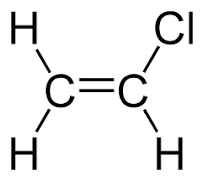Vinyl Chloride (VC)
What is VC?
Vinyl Chloride is an organochloride with the formula H2C=CHCl that is also called vinyl chloride monomer (VCM) or chloroethene. This colorless compound is an important industrial chemical chiefly used to produce the polymer polyvinyl chloride (PVC). About 13 billion kilograms are produced annually.
Uses
Most of the vinyl chloride produced in the United States is used to make polyvinyl chloride (PVC), a material used to manufacture a variety of plastic and vinyl products including pipes, wire and cable coatings, and packaging materials. Smaller amounts of vinyl chloride are used in furniture and automobile upholstery, wall coverings, housewares, and automotive parts. Vinyl chloride has been used in the past as a refrigerant.
Sources & Potential Exposure
Most vinyl chloride is used to make polyvinyl chloride (PVC) plastic and vinyl products. Acute (short-term) exposure to high levels of vinyl chloride in air has resulted in central nervous system effects (CNS), such as dizziness, drowsiness, and headaches in humans. Chronic (long-term) exposure to vinyl chloride through inhalation and oral exposure in humans has resulted in liver damage. Cancer is a major concern from exposure to vinyl chloride via inhalation, as vinyl chloride exposure has been shown to increase the risk of a rare form of liver cancer in humans.Vinyl chloride is a microbial degradation product of trichloroethylene in groundwater, and thus can be found in groundwater affected by trichloroethylene contamination.
Federal Regulations
EPA has classified vinyl chloride as a Group A, human carcinogen.

 Americas
Americas Europe
Europe Français
Français Deutsch
Deutsch Italiano
Italiano Español
Español

